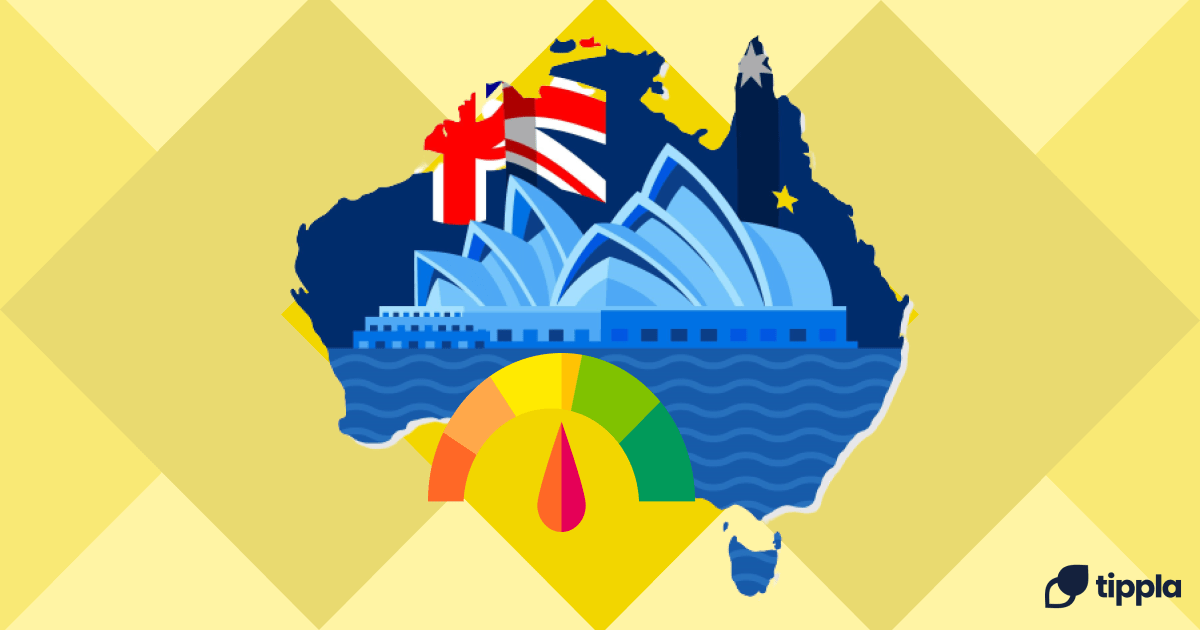Published in September 1, 2023
Building Your Credit Profile Early

A Guide for Students and Young Adults
Disclaimer: This content does not constitute financial advice. The article below is for the readers’ information and education only. The writers at Tippla are not financial advisors and are therefore not authorised to offer financial advice. Tippla recommends our readers to always do their research and seek independent advice as needed.
Embarking on the journey of adulthood brings with it a multitude of exciting opportunities and challenges. As a student or young adult in Australia, you are likely to find yourself navigating a world of independence, education, and career prospects. Among the many facets of life you’ll encounter, there’s one that often remains overlooked but holds tremendous power in shaping your financial future: your credit file.
Your credit profile, often referred to as your credit history or credit score, plays a pivotal role in your financial life. It influences your ability to secure loans, rent an apartment, buy a car, and even land your dream job. While building a positive credit history may not be the most glamorous part of your young adult life, it is undoubtedly one of the most significant steps you can take toward securing your financial success.
In this guide, tailored specifically for students and young adults, we aim to empower you with the knowledge and tools needed to start building a robust and positive credit history early in life. We understand that the world of credit can seem complex and daunting, but by following the steps and tips outlined in this guide, you will be well-equipped to embark on this journey with confidence.
Understanding The Basics of Credit
Credit refers to the ability of an individual or entity to borrow money or obtain goods and services with the understanding that they will repay the borrowed funds, often with interest, at a later date. Your credit score is essentially a measure of trustworthiness and financial responsibility.
Now, let’s dive into credit scores. These are essentially like report cards for your financial behaviour. They provide a snapshot of how responsible you are when it comes to paying back the money you’ve borrowed. In Australia, credit scores typically range between 0 and 1,200, where higher scores are better. A higher score indicates to lenders that you’re a more trustworthy borrower, increasing the likelihood that they’ll have confidence in your ability to repay.
How Credit Scores Affect Borrowing and Interest Rates
A high credit score suggests that you have a history of managing credit obligations diligently, including making timely payments and maintaining low credit card balances. This history signals to lenders that you are likely to continue responsible financial behaviour, making you a lower-risk borrower and potentially qualifying you for better loan terms and interest rates. Lower interest rates mean you’ll pay less for the money you borrow. But if your credit score is on the lower end, lenders might hesitate to give you a loan. And if they do, the interest rates can be higher because they want to make sure they get their money back, even if it’s a bit riskier.
So, understanding credit and credit scores is like knowing how your financial reputation affects your wallet. It’s a big deal, and it’s crucial to start building a positive credit history early in life to make your financial future brighter.
Why Building Credit Early Matters
Alright, let’s talk about why it’s a smart move to start building your credit early in life.
Advantages of Getting Credit Young
When you begin building credit while you’re still a young adult, you’re setting yourself up for a bunch of good stuff:
Getting Loans When You Need Them
Think about buying a car, going to university, or even starting your own business someday. These things often require a bit of financial help. When you’ve got a solid credit history, banks, other financial institutions, and lenders are more likely to say “yes” to giving you the money you need.
Mortgages for Your Dream Home
If you’re dreaming of owning a house in the future, having good credit is like having the golden key. Lenders trust you more, so they’re more likely to approve your mortgage application. Plus, they’ll usually give you better deals with lower interest rates.
Credit Cards with Perks
Credit cards can be super handy, especially for emergencies or booking that dream holiday. With a good credit history, you can snag credit cards with great perks like cashback rewards, travel miles, and more. It’s like getting a bonus for being responsible with money.
Setting the Stage for Good Money Habits
Starting early with credit helps you build responsible money habits. You’ll learn how to manage your finances wisely, pay your bills on time, and avoid bad debt traps. These skills will serve you well throughout your life.
Understanding Your Current Financial Situation
Let’s take a look at where you’re at right now when it comes to money. This is like checking the map before you start a road trip – you need to know where you are to figure out where you want to go.
Assessing Your Financial Habits and Know-How
First things first, let’s see how you’re doing with your money habits and what you know about finances. Are you pretty good at budgeting, or do you sometimes wonder where your money went by the end of the month? It’s alright either way – knowing where you stand is the first step to getting better.
Identifying Any Existing Credit History or Credit Card Accounts
Next up, let’s find out if you’ve already dipped your toes into the credit pool. Do you have a credit card, a student loan, or maybe even a mobile phone contract? These are all things that can show up on your credit history. You can check out Tippla, a credit score management platform that provides services related to monitoring and tracking your credit score.
Building Credit as a Student
Building credit when you’re a student is pretty important for your financial future. It’s like laying the groundwork for being able to do adult things like getting a loan for a car, renting a place to live, and sometimes even landing a job. But, you don’t necessarily need to jump into getting a credit card right away. Here are some smart ways to build credit:
Become an Authorised User
If you have a family member who has a credit card and pays their bills on time, you can ask them to add you as an “authorised user” on their card. This means their good credit behaviour will show up on your credit report.
Student Loans
If you have student loans, paying them on time can actually help boost your credit score. But remember, only borrow what you absolutely need for your education. Going overboard can lead to stress down the road.
Credit Builder Loans
Some credit unions and banks offer something called “credit builder loans.” These are made for folks who are just starting to build credit. You basically borrow a small amount, and the lender keeps it in a savings account. As you make payments, they tell the credit bureaus, which helps build your credit history.
Rent Reporting Services
Some services let you report your rent payments to the credit bureaus. If you’re a responsible renter, this can be a simple way to build credit without taking on extra debt.
Secured Loans
A secured loan is kind of like a safety-net loan. You put some money into an account as collateral, and then you borrow against it. By paying it back on time, you show lenders you can handle credit responsibly.
Utility and Cell Phone Bills
Sometimes, utility companies and cell phone providers report your payment history to the credit bureaus. Paying these bills on time can gradually build up your credit.
Peer-to-Peer Loans
There are online platforms where regular people lend money to each other. These loans can be easier to get than traditional ones, and if you pay on time, it can help your credit.
Build Savings Habits
This isn’t about credit directly, but having a good savings history can make lenders more likely to approve you for loans. It shows them you’re responsible with your money.
Monitoring Your Credit
It’s always a good idea to keep an eye on your credit. It’s kind of like regularly checking the health of your bank account – it helps you stay on top of your financial game.
The Value of Regularly Checking Your Credit Report
Your credit report is like your financial report card. It tells lenders how responsible you are with money. Checking it regularly has a few important perks:
- Spotting Errors: Sometimes, mistakes happen. You might see something on your report that belongs to someone else or a payment marked as late when it wasn’t. By checking, you can catch these errors and fix them.
- Preventing Identity Theft: If someone tries to steal your identity and open accounts in your name, you can catch it early by monitoring your credit. This can save you a ton of trouble down the line.
- Knowing Where You Stand: Your credit report clearly shows your financial health. It’s like stepping on a scale to track your progress. Are your finances getting better, or is there room for improvement?
Identifying and Disputing Errors on Your Credit Report
If you spot something wrong on your credit report, don’t panic. Here’s what you can do:
- Contact the Credit Reporting Agency: Get in touch with the credit reporting agency that issued the report with the error. In Australia, there are three main ones: Equifax, Experian, and Illion.
- Provide Proof: Explain what’s wrong and provide any evidence you have so that they can investigate the issue.
- Follow Up: Keep an eye on your report to make sure the error gets fixed. It might take a little time, but persistence pays off.
Tracking Your Credit Score’s Progress Over Time
Your credit score is like the summary of your credit report. It condenses all your financial behaviour into one number. Tracking your score over time is like watching your fitness improve on a workout app – it shows you how you’re doing.
- Check Regularly: You can check your credit score for free through some online services like Tippla. Doing it regularly helps you see how your financial habits affect your score.
- Understand the Factors: Learn what factors influence your score, like paying bills on time and managing your debts.
- Set Goals: Use your score as a benchmark. If it’s not where you want it to be, set goals to improve it. This can help you qualify for better loans and deals.
Avoiding Common Credit Mistakes
-
Late Payments on Existing Loans
Missing the due date on your credit card or loan payments can be a real downer for your credit score. Even one late payment can haunt your credit report for years.
To keep this pitfall at bay, consider setting up payment reminders or automatic payments through your bank. This way, you’ll never forget to pay on time, ensuring your credit score remains intact.
-
Maxing-Out Credit Cards
Using up every bit of your available credit is like walking a tightrope of financial risk. It sends the message that you might be struggling to handle your debts.
The trick here is to use only a portion of your credit limit, ideally keeping your credit card balance below 30% of the limit. This showcases lenders that you can manage your credit responsibly without maxing out your cards.
-
Missed Payments and Loan Defaults
Missing numerous payments and letting your loan slip into default territory can wreak havoc on your credit score. It might even trigger collection actions.
Should you find yourself facing financial difficulty, always reach out to your lender. They might be able to work out a temporary solution, like a repayment plan, to help you steer clear of this credit disaster.
-
Too Many Active Loans
Handling multiple loans simultaneously can become a juggling act. It can also set off warning signals with lenders, potentially making it tough to secure new credit.
Exercise caution when considering new loans if you’re already juggling several. It’s often wiser to prioritise paying off your existing debts before taking on additional ones.
-
Multiple Loan Applications
Applying for credit from multiple lenders within a short span can harm your credit score. It may give the impression that you’re desperate for credit, which isn’t seen favourably.
Before you hit that “apply” button, research and compare loan options thoroughly. Ensure you’re a strong candidate for approval to prevent unnecessary dings to your credit score.
Balancing Credit Usage with Savings
Saving money while you’re working on your credit is like having a safety net. Life can throw unexpected expenses your way, and having savings can help you avoid relying too heavily on credit when those surprises come knocking.
Creating a Budget that Prioritises Savings and Debt Repayment
Here’s the game plan: create a budget for your savings and debt.
- Set Clear Goals: Determine how much you want to save and how you plan to use credit wisely. Having specific goals will keep you focused.
- Allocate Your Income: Make sure your budget allocates a portion of your income to savings. This could be for an emergency fund, retirement, or other financial goals.
- Tackle Debt Strategically: If you have existing debts, create a plan to pay them off. Focus on high-interest debts first while still making minimum payments on others.
- Build an Emergency Fund: Having an emergency fund is crucial. It can cover unexpected expenses without resorting to credit, keeping your credit usage in check.
- Control Credit Usage: Use credit when it makes sense, like for building your credit history, but don’t rely on it for everyday expenses if you can avoid it.
Achieving a Healthy Balance Between Credit-Building and Financial Security
So, how do you strike that perfect balance between credit and savings? It’s about finding the sweet spot:
- Prioritise Saving: Always aim to save a portion of your income, no matter how small. Even a little bit adds up over time.
- Use Credit Responsibly: When you use credit, do it wisely. Pay your bills on time, keep your balances low, and avoid maxing out your credit cards.
- Emergency Fund First: Before focusing too heavily on credit-building, ensure you have an emergency fund to handle unexpected expenses without relying on credit.
- Regularly Review Your Budget: Life changes, so should your budget. Regularly review and adjust it to make sure you’re staying on track with both savings and credit goals.
Remember, it’s not about choosing between credit-building and savings – it’s about doing both in a way that secures your financial future. Balancing these two goals might take some effort, but it’s a path to financial security and peace of mind.
Conclusion
Building and managing your credit while simultaneously nurturing your savings is a pivotal strategy in securing a strong financial future. By starting early and using credit responsibly, you lay the groundwork for a robust credit history that opens doors to various financial opportunities.
Regularly monitoring your credit helps you stay on top of your financial health, enabling you to spot and correct errors and track your progress. Avoiding common credit pitfalls, such as late payments and excessive debt, is essential for maintaining a positive financial reputation.
Balancing savings and credit usage is like building a safety net to guard against overreliance on credit during unexpected financial challenges. Creating a purposeful budget and setting clear financial goals guide you on this journey, ensuring that you’re on track to achieve your aspirations. It’s not just about managing your money; it’s about setting a course for a secure and prosperous future.
While we at Tippla will always do our best to provide you with the information you need to financially thrive, it’s important to note that we’re not debt counsellors, nor do we provide financial advice. Be sure to speak to your financial services professional before making any decisions.
Related articles

Credit Scores in Australia, How Do They Work?
12/10/2021
Your credit score can have far-reaching implications for numerous...

How Can You Improve Your Credit Score? A Quick Guide
30/07/2021
We’ve said it time and again – your credit...


What’s The Difference Between Visa and Mastercard?
28/07/2021
Visa and Mastercard are household names, recognised across the...
Subscribe to our newsletter
Stay up to date with Tippla's financial blog